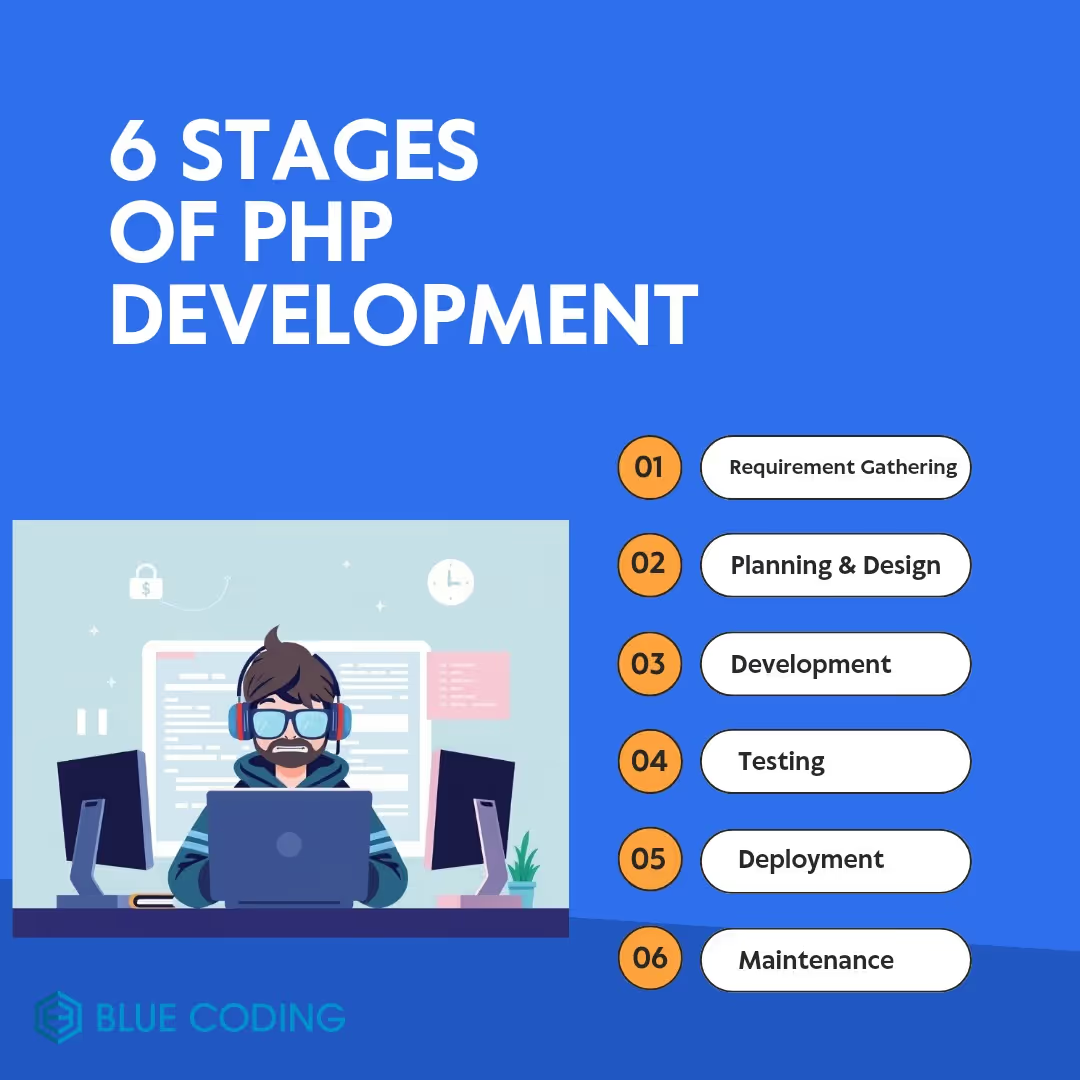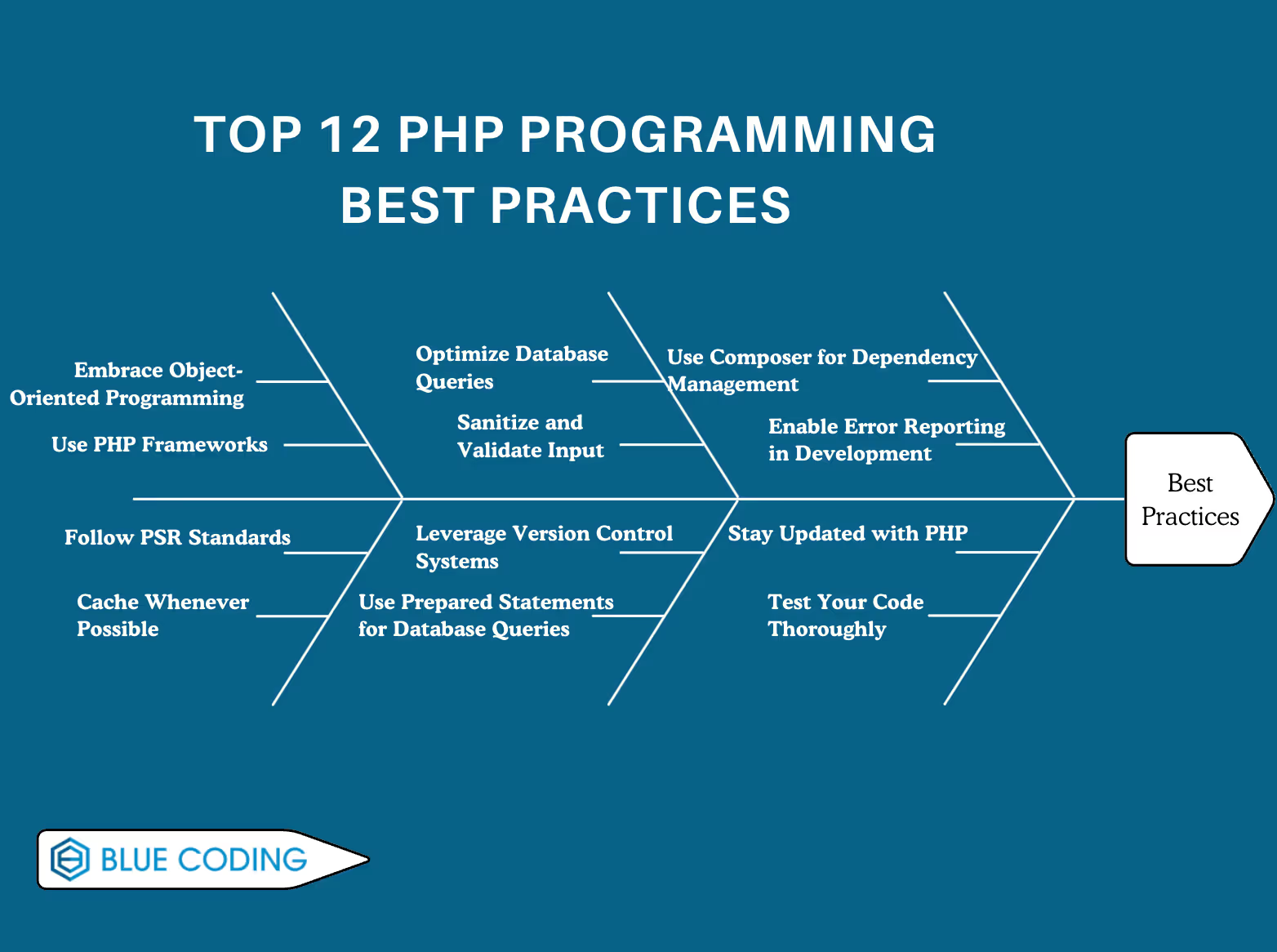Even in the year 2024, PHP remains one of the most popular programming languages for building web applications due to its simplicity, flexibility, and extensive community support. Whether you're just starting out or are an experienced PHP developer, staying on the mission to constantly improve your skills and adopting best practices can significantly enhance the quality of your code. In this article, we discuss the top 12 tips all PHP programmers should know, to ensure that the projects are efficient, secure, and scalable. If you're looking to hire PHP developers, we have the solution for you as well!


Object-oriented programming is a key practice for PHP developers who want to write clean, maintainable, and scalable code. OOP allows you to group related tasks into classes and objects, making your code easier to understand and manage. In PHP, OOP can improve performance by reducing redundancy through code reuse. Start with understanding basic OOP concepts such as classes, objects, inheritance, encapsulation, and polymorphism. Once you’re comfortable, explore advanced OOP techniques like abstract classes and interfaces, which will allow you to create more flexible and extensible applications.
Using a framework can save time and ensure that your application follows best practices. PHP frameworks like Laravel, Symfony, and CodeIgniter provide pre-built modules and tools, allowing you to focus on the unique aspects of your application rather than reinventing the wheel. Frameworks also encourage adherence to the Model-View-Controller (MVC) architecture, which helps to keep the codebase clean and organized. A solid framework will also have built-in security features and tools for tasks such as routing, authentication, and form validation, further speeding up development.
Databases are often the backbone of web applications, and poorly written queries can lead to performance bottlenecks. Always optimize your queries to minimize database load. For example, avoid retrieving more data than necessary from your database; instead, only retrieve the specific columns or rows you need. Moreover, indexing your database can drastically improve query performance, particularly for large datasets. Tools can help you understand how your queries are being executed and identify potential bottlenecks.
Security is paramount in web development, and one of the easiest ways to protect your application is by sanitizing and validating user input. This prevents common vulnerabilities such as SQL injection, Cross-Site Scripting (XSS), and Cross-Site Request Forgery (CSRF). PHP offers several built-in functions that help sanitize and validate input, ensuring your application handles data safely.
Instead of manually downloading and maintaining external libraries, Composer fetches the latest versions and keeps everything in sync. This also ensures you’re using the most secure and up-to-date versions of packages, reducing the risk of vulnerabilities creeping into your codebase. Also, Composer’s autoloading feature makes it easier to manage classes across different files without needing manual `include` statements.
During development, enabling error reporting can help you catch potential bugs and issues early on. This is a vital step to remember if you wish to become a PHP programmer. Configure error reporting to display all errors, warnings, and notices while you’re developing. However, remember to turn off error reporting in production environments to avoid exposing sensitive information to users. You can also leverage PHP software development's logging features to track errors in production environments by writing issues to a file instead of displaying them.
PHP-FIG (PHP Framework Interop Group) provides a set of standards known as PSRs (PHP Standard Recommendations). Following these standards ensures that your code is consistent, readable, and compatible with other developers’ work. PSR-1 and PSR-2 cover basic coding styles and structures, while PSR-4 deals with autoloading classes, allowing for easy interoperability between frameworks and libraries. Adopting these standards makes it easier to collaborate on projects and transition between different codebases.
Caching can significantly improve the performance of your PHP application by reducing the load on your server and database. Tools like Redis and Memcached can store frequently accessed data in memory, minimizing database queries and improving page load times. For even more control, PHP also supports various levels of caching, such as opcode caching, where compiled PHP code is stored and reused, reducing the need for recompilation. This is one of the PHP programming basics to remember.
SQL injection is one of the most common vulnerabilities in PHP applications, and prepared statements are an easy way to mitigate this risk. By using prepared statements with parameterized queries, you can ensure that user input is automatically escaped, making it difficult for malicious users to inject SQL code. Prepared statements offer an easy and secure way to interact with your database while avoiding common security pitfalls.
Using version control systems like Git is crucial for tracking changes to your codebase and collaborating with other developers. Git enables you to manage multiple versions of your project, experiment with new features in branches, and quickly roll back to previous versions if necessary. For larger projects, tools like GitHub, GitLab, or Bitbucket provide repositories where you can host your code, review pull requests, and manage issues more efficiently.
PHP is constantly evolving, and staying up to date with the latest features, security patches, and performance improvements is essential. PHP 7 introduced many new features such as improved performance, type declarations, and error handling, while PHP 8 added features like the JIT compiler and union types. Regularly updating your PHP version can enhance the speed and security of your application, while also giving you access to the latest language features that simplify development.
Testing should be an integral part of your development workflow. Unit tests, integration tests, and functional tests help you catch bugs early, ensure that new features don’t break existing functionality, and maintain high code quality. PHP testing tools such as PHPUnit allow you to automate testing and make it easier to spot potential issues before your code reaches production. Test-driven development (TDD) is another approach that can help improve code quality by writing tests before you even start coding.
By following the 12 tips discussed above, you can surely improve your PHP development skills and build more strong, secure, and innovative applications. If you're looking to find remote opportunities as a PHP developer, Blue Coding is a reliable software solutions agency. Our developers enjoy a friendly and productive work environment from the peace of their own home office. We advise our team of developers to keep learning, stay updated, and continually refine your approach to PHP programming to stay ahead in this ever-evolving field. Check out our open vacancies to apply to what suits you best!
Subscribe to our blog and get the latest articles, insights, and industry updates delivered straight to your inbox